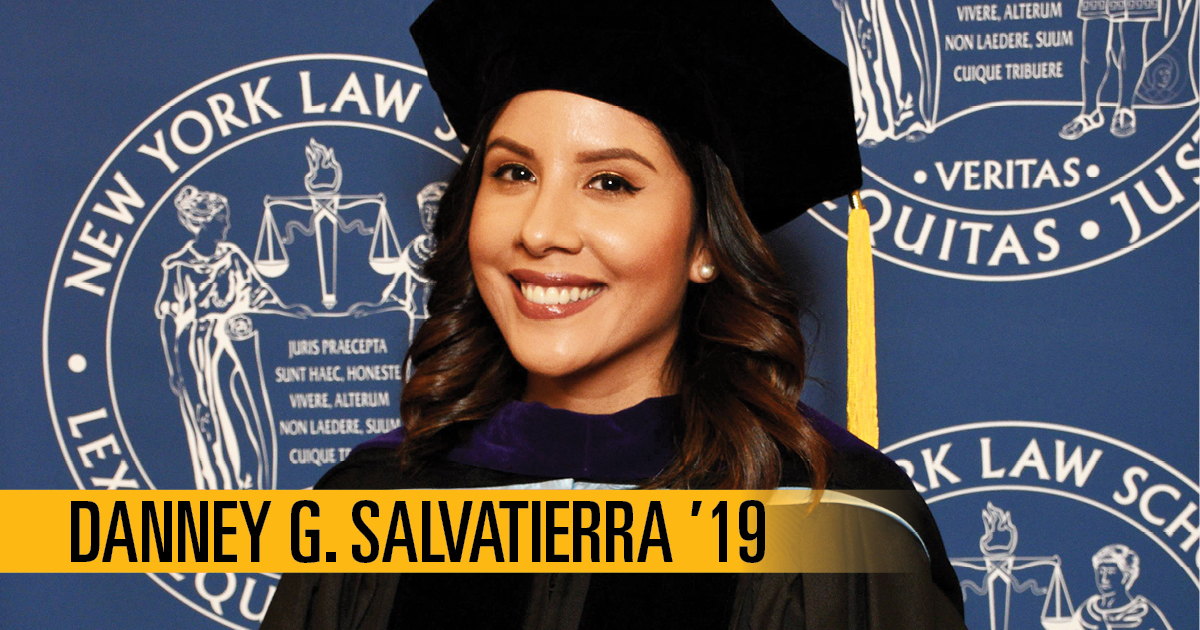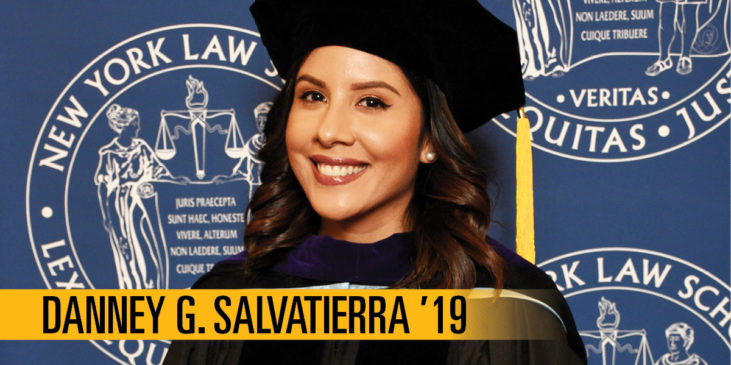
Just two months ago, Danney Salvatierra ’19 crossed the stage at Lincoln Center to receive her NYLS diploma.
Now, she’s following in the steps of her mentor, Professor Claire Thomas ’11, by joining African Services Committee (ASC) as a Staff Attorney. ASC is a multi-service human rights agency, assisting refugees from Africa and other immigrants in New York City with resettlement efforts, housing, medical, family, immigration, and public benefits matters. It’s where Professor Thomas also began her legal career.
Salvatierra recently reflected on her time at NYLS and her professional goals.
What activities and internships did you pursue at NYLS?
During my 1L summer and my 2L fall, I conducted research for Professor Lenni Benson, who oversees NYLS’s immigration law programming, and the nonprofit she founded, the Safe Passage Project. I’ve always been interested in human rights work, but it wasn’t until I started law school that I realized immigration law was the right field for me to explore. Working with Professor Benson opened my eyes to what a career in this field entails.
The following summer, I interned with the legal department at Church World Service, which works directly with the United Nations on resettlement efforts worldwide. This includes helping immigrants and refugees resettle in the United States through English classes, job search assistance, and professional skill-building programs.
Later in law school, I interned for the refugee representation department at Human Rights First, where I assisted lawyers with asylum cases.
I also participated in NYLS’s Asylum Clinic, run by Professor Thomas. There, I had my own cases, and, for the first time, I was able to work on a case from start to finish. I was even able to obtain asylum for one of my clients. The experience was deeply fulfilling and confirmed that immigration law is my passion.
How did NYLS prepare you for your new job?
From my very first class at NYLS, I knew I was gaining the skills I would need to become a great lawyer.
The Asylum Clinic played a huge role in my professional development; it’s where I learned and was able to practice most of my methodical and analytical skills. The clinic also taught me that immigration law doesn’t just require intelligence—it also requires empathy. The experience made me a better advocate for my clients.
Also, being part of NYLS’s Moot Court Association enabled me to sharpen my public speaking skills, as well as my ability to think on my feet and to appear before federal judges.
What responsibilities does the job include?
ASC offers many different support programs. I’m going to work in the legal department, which deals with family law and immigration law. As a Staff Attorney, I will handle a wide range of matters pertaining to child custody, housing, asylum, and citizenship. This includes interviewing clients and drafting affidavits, conducting legal research, and writing legal memoranda. Upon obtaining my license, I’ll be able to go to court on my own.
What advice would you give aspiring immigration lawyers?
First, I would urge them to come to NYLS! Talk to Professors Benson and Thomas. They are amazing resources and wonderful mentors. I cannot emphasize enough how important mentorship is.
Second, I would encourage NYLS students to explore the Asylum Clinic and the Immigration Law and Litigation Clinic, which works with the Safe Passage Project. These clinics offer hands-on experience, and they’re easily accessible on campus.
I also recommend that students take Immigration Law and join NYLS’s Immigration Law Students Association. The field is complex. It’s helpful to gain a strong foundation and meet classmates with similar career goals.
Finally, I would encourage prospective immigration law students to have a conversation with themselves and ask the following questions, “Do I enjoy helping others? Do I want to see a change in our society?” The immigration system has always needed strong advocates. Now, more than ever, we need thoughtful, compassionate people in this field.
What inspires you about this work?
My clients continue to teach me how to be a strong immigration lawyer. Immigration law is a very special field. It takes more than legal skills; it requires inner strength. Those who ask for help have often gone through so much sacrifice and pain.
My clients’ resiliency leaves me in awe, and I do my best to tackle their cases with the utmost care and humility. I make sure they know they’re not alone in this process by connecting with them and saying, “I think that you are so strong, and I am going to help you.” I am very fortunate to have found work this rewarding.
Related

